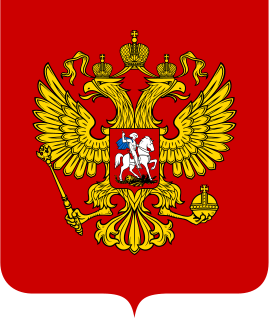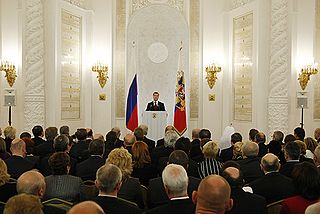
Volgograd Oblast is a federal subject of Russia, located in the Volga region of Southern Russia. Its administrative center is Volgograd. The population of the oblast was 2,610,161 in the 2010 Census. Formerly known as Stalingrad Oblast, it was given its present name in 1961, when the city of Stalingrad was renamed Volgograd as part of de-Stalinization. Volgograd Oblast borders Rostov Oblast in the southwest, Voronezh Oblast in the northwest, Saratov Oblast in the north, Astrakhan Oblast and the Republic of Kalmykia in the southeast, and has an international border with Kazakhstan in the east. The two main rivers in European Russia, the Don and the Volga, run through the oblast and are connected by the Volga–Don Canal. Volgograd Oblast's strategic waterways have made it a popular route for shipping and for the generation of hydroelectricity.

The Ministry of the Russian Federation for Civil Defence, Emergencies and Elimination of Consequences of Natural Disasters, also known as The Ministry of Emergency Situations, MChS, or internationally as EMERCOM, is a government agency overseeing the civil emergency services in Russia.

The Judiciary of Russia interprets and applies the law of Russia. It is defined under the Constitution and law with a hierarchical structure with the Constitutional Court and Supreme Court at the apex. The district courts are the primary criminal trial courts, and the regional courts are the primary appellate courts. The judiciary is governed by the All-Russian Congress of Judges and its Council of Judges, and its management is aided by the Judicial Department of the Supreme Court, the Judicial Qualification Collegia, the Ministry of Justice, and the various courts' chairpersons. And although there are many officers of the court, including jurors, the Prosecutor General remains the most powerful component of the Russian judicial system.

The annual Presidential Address to the Federal Assembly is a speech given by the Russian President to outline the state and condition in which Russia is in. It is given in front of a joint meeting of the two houses of the Russian Parliament: the State Duma and Federation Council. The Article 84 of the current Constitution of Russia enacted in 1993 says "The President of the Russian Federation shall: address the Federal Assembly with annual messages on the situation in the country, on the guidelines of the internal and foreign policy of the State". First Russian President Boris Yeltsin delivered the first Address to the Federal Assembly on 24 February 1994. The date of the presidential address is not fixed.

The Military-Industrial Commission of the Russian Federation was established by a presidential decree in March 2006. According to the decree, it is a permanently functioning body with vast responsibilities for supervising the distribution and implementation of the "State defense order". The commission answers directly to the President of Russia. It coordinates between the Defence Ministry of the Russian Federation, the Armed Forces of the Russian Federation, and the defense industry of Russia. Until then, the defense industry was supervised by Russia's Ministry of Industry and Energy, as well as by the previous government consultative body with a similar name.

Vladimir Sergeyevich Gruzdev is a Russian politician. He was a deputy of the State Duma (2003-2011) and governor of the Tula Oblast (2011-2016). Also since December 2016 - Chairman of the Board of the Association of Lawyers of Russia.

Alexander Vladimirovich Yakovenko is a Russian diplomat. He served as the Ambassador of Russia to the United Kingdom between January 2011 and August 2019. Since August 2019, he has been rector of the Diplomatic Academy of the Ministry of Foreign Affairs. He is a former Deputy Minister of Foreign Affairs of Russia. While working at the Ministry of Foreign Affairs in Moscow, he was in charge of multilateral diplomacy. A graduate of the Moscow State Institute of International Relations in 1976, he later gained a Doctor of Law degree. Yakovenko holds the diplomatic rank of Ambassador Extraordinary and Plenipotentiary, and speaks Russian, English and French.

The visa policy of Russia deals with the requirements which a foreign national wishing to enter the Russian Federation must meet to obtain a visa, which is a permit to travel to, enter, and remain in the country. Visa exemptions are based on bilateral or multilateral agreements. Russia has agreements with scores of countries whose citizens are either exempt from visas or can apply for a visa online (e-visa). Citizens of countries without such an agreement with Russia must obtain a visa in advance from a Russian diplomatic mission or visa centre.

Mikhail Viktorovich Babich is a Russian politician and diplomat. Russian Ambassador to Belarus since 24 August 2018.
The municipal divisions in Russia, also called municipal formations, are territorial divisions of the Russian Federation which are formally granted the authority to manage local affairs through local self-government. As of January 1, 2020, there are 20,846 municipal divisions in Russia, including 1,673 municipal divisions, 635 urban okrugs, and 33 municipal okrugs.
Ministry of Regional Development of Russia was the federal ministry in the Russian government that was responsible for regional social development. The last minister was Igor Slyunyayev, who was appointed in 2012 as part of Dmitry Medvedev's Cabinet.

The visa history of Russia deals with the requirements, in different historical epochs, that a foreign national had to meet in order to obtain a visa or entry permit, to enter and stay in the country.

Konstantin Iosifovich Kosachev is a Soviet and Russian politician and diplomat. He is a senator at the Federation Council and chairs its Foreign Affairs Committee. He has been on the US sanctions list since 2018.

The Federal Service for Military-Technical Cooperation is a Russian government service regulating Military-Technical Cooperation issues. The service reports to the President, and is subject to jurisdiction of the Ministry of Defense. The organizational structure consists of the Central Office and its representative offices in foreign states.

Eleonora Valentinovna Mitrofanova is a Russian politician and diplomat. She currently serves as the Ambassador of Russia to Bulgaria, having held the post since 15 January 2021. She was previously ambassador-at-large of the Ministry of Foreign Affairs and a Permanent Delegate of to UNESCO (2009–2016). She was the first woman to hold the post of First Deputy Minister of Foreign Affairs.
Anvar Sarvarovich Azimov is a Russian politician and diplomat. He served as Ambassador to Croatia from 2015 until August 2020.
The amendments of 2020, which were proposed in January 2020, are the second substantial amendments to the Constitution of Russia of 1993. To introduce these amendments, Vladimir Putin, president of Russia, held a national vote. They were approved on 1 July 2020 by a contested popular vote.

Directorate of the President of the Russian Federation is a federal executive body that organizes and directly provides material and technical support and social, medical, and sanatorium and resort services for the activities of federal government bodies. Created on November 15, 1993 by Presidential decree No. 735-rp to replace Main Social and Industrial Administration of the Administration of the President of the Russian Federation (GSPU). Since August 2, 1995 it has the status of a federal executive body and as of 2013 employs 500 workers.

Commissioner for Human Rights in the Russian Federation is an official appointed by the State Duma, the lower house of the Federal Assembly of Russia, to consider complaints of Russian and foreign citizens and stateless persons on Russia's territory of against decisions or actions of state bodies and officials.

Vladislav Nikolayevich Tumanov, is a Russian politician who had served as the 2nd Governor (Head) of Pskov Oblast from 1992 to 1996.














